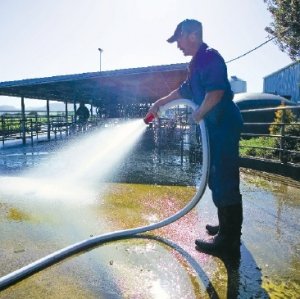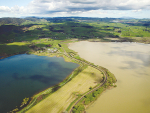ABOUT 3500 Waikato farmers will soon require resource consent to take extra water for dairy shed use.
A recent Environment Court ruling has paved the way for the Waikato Regional Council to implement its Variation 6 to the Waikato Regional Plan. This allows the council to progressively introduce new policies and rules for allocating and using water in the region. Developed in response to growing demand for water from various sectors, it sets allocation limits for all rivers and streams, and their minimum flows.
After agreements with the agricultural sector, dairy farms will be allowed to take 15m3/ day/certificate of title for dairy shed use. Takes above this will require a resource consent.
The resource consenting process will be staged over the next few years. Farmers will have till January 1, 2015 at the latest to apply for consents. The council estimates 3500 farmers will need consent.
WRC catchment management programme manager David Speirs says confirmation of the final shape of Variation 6 means the council can now get on with implementing the policies and rules.
"Now we have the court decision, we plan a resource consent implementation strategy with agriculture industry stakeholders. We will tell farmers the details of when they need to apply for resource consent to take more than 15m3/day."
Existing 'extra' takes above 15m3/day will generally be 'grandparented' as at October 2008 levels, Speirs says. Under this provision of Variation 6, farmers will generally get the grandparented 'extra' amount requested provided they apply for a consent and meet the conditions, including riparian management plans to prevent sediment, effluent and nutrients from getting into waterways.
The court has also allowed for more water takes between Taupo and Karapiro than were originally proposed.
Variation 6's requirements will complement a broader regional strategy now being developed, aimed at better protecting Waikato waterways.
Surface water demand in Waikato is 1.36 million m3/day; ground water demand is 430,000m3/day. All water flowing to the sea from the Waikato River is said to have been removed from the natural river channel and used at least seven times before it reaches the ocean.
Pressure on water resources has increased markedly in recent years, says Spiers.
"For example, the area of land being irrigated has nearly doubled in the last ten years. Water is a finite resource and, in some places, is already fully allocated. Variation 6 seeks to strike a balance between managing the adverse environmental effects of taking and using water and [allowing people] to use water in an environmentally sustainable way."
The new rules are to ensure enough water remains in waterways to protect aquatic life and provide for recreation, and to meet domestic, municipal, agricultural and industrial needs as far as possible, Spiers says.











